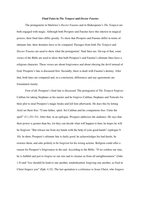Final Fates in The Tempest and Doctor Faustus
The protagonists in Marlowe’s Doctor Faustus and in Shakespeare’s The Tempest are
both engaged with magic. Although both Prospero and Faustus have this interest in magical
powers, their final fates differ greatly. To show that Prospero and Faustus differ in terms of
ultimate fate, their destinies have to be compared. Passages from both The Tempest and
Doctor Faustus are used to show what the protagonists’ final fates are. On top of that, some
verses of the Bible are used to show that both Prospero’s and Faustus’s ultimate fates have a
religious character. These verses are about forgiveness and about obeying the devil instead of
God. Prospero’s fate is discussed first. Secondly, there is dealt with Faustus’s destiny. After
that, both fates are compared and, in a conclusion, differences and any agreements are
formulated clearly.
First of all, Prospero’s final fate is discussed. The protagonist of The Tempest forgives
Caliban for taking Stephano as his master and he forgives Caliban, Stephano and Trinculo for
their plot to steal Prospero’s magic books and kill him afterwards. He does this by letting
Ariel set them free: “Come hither, spirit. Set Caliban and his companions free: Untie the
spell” (5.1.251-53). After that, in an epilogue, Prospero addresses the audience. He says that
their power is greater than his, for they can decide what will happen to him; he hopes he will
be forgiven: “But release me from my bands with the help of your good hands” (epilogue 9-
10). In short, Prospero’s ultimate fate is fairly good; he acknowledges his bad deeds, he
restores them, and asks politely to be forgiven for his wrong actions. Religion could offer a
reason for Prospero’s forgiveness in the end. According to the Bible, “If we confess our sins,
he is faithful and just to forgive us our sins and to cleanse us from all unrighteousness” (John
1.9) and “[we should] be kind to one another, tenderhearted, forgiving one another, as God in
Christ forgave you” (Eph. 4.32). The last quotation is a reference to Jesus Christ, who forgave






